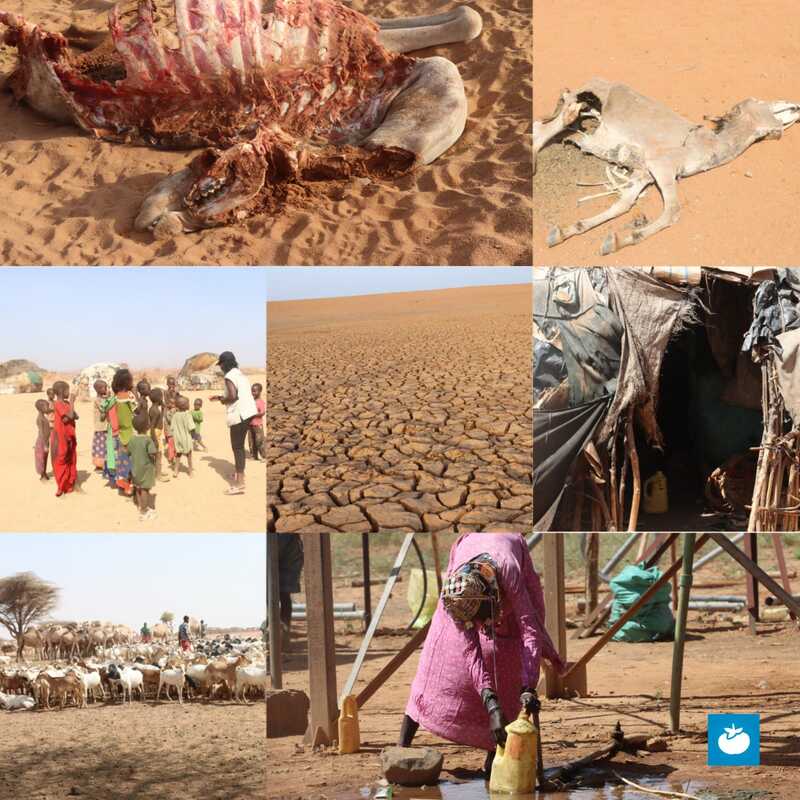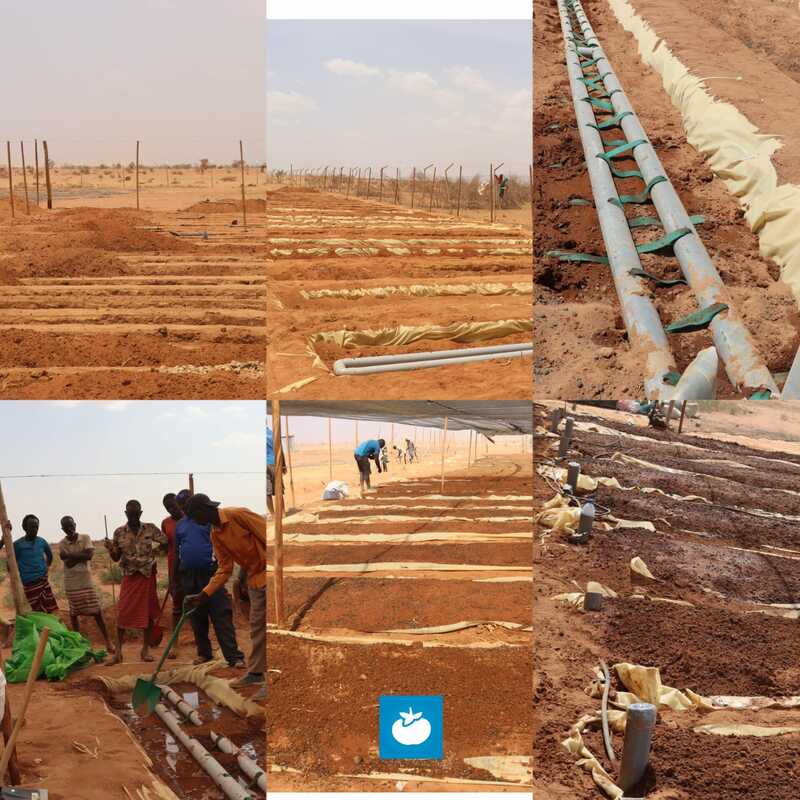PlantVillage Commissions Agricultural Transformation of Kenya’s Marsabit Drylands Through Irrigation Technology
Posted on
The PlantVillage team in Kenya, has constructed the first-ever underground capillary wick irrigation system at the Ririma borehole in Marsabit County (Northern Kenya) for growing vegetables: cabbages, kale, curly kale, Swiss chard, capsicum, beetroot, and sweet potato vines.
The project comes as the drought situation in Kenya escalates, with communities in the Arid and Semi Arid Lands (ASAL regions) experiencing the worst effects in years. We are now entering the 6th successive below normal rain season which has led to widescale stress in the community.
The vegetable project is a resilience revolution and a bold step towards regreening Marsabit and, in the process, combating drought and famine, contributing to the national goal of food security for its people, and empowering vulnerable families through income generation.

"Our goal is for tens of thousands of hectares to be transformed from bone-dry sand to vegetable-sprouting soil. Water exists underground; if we can have golf courses in Arizona, we can surely have vegetable plots in the Horn of Africa," opines David Hughes, founder and director of PlantVillage.
A closer look at Marsabit County
According to the National Drought Management Authority (NDMA) 2022 report, in ASALs, the hunger and famine crisis continues to regress. PlantVillage has been partnering with the Climate Hazard Center in the USA to provide forecasts on the on-going drought.
There is declining food security in Kenya’s 23 ASAL counties, Marsabit being one of them. The nutrition status of children and women has worsened due to prolonged drought; crop production is below average, significantly driven by poor rainfall performance; livestock productivity is on a declining trend with high mortality rates in pastoral zones; high staple food prices persist; and there is increased conflict and insecurity causing tension, hence household livelihood activities remain constrained.

Figure 1: An overview of Marsabit landscape, manyatta houses, children and livestock
PlantVillage’s Dream Team Agro Consultancy Limited director Dr. John Chelal, ASALs team coordinator Melodine Jeptoo, and field officers Fofen Lawrence and Rashid, toured the Kargi Ward in Loiyangalani Sub-county, Marsabit County, and observed high levels of household poverty, women and children walking long distances in high temperatures in search of water as the low rainfall totals have resulted in the drying of water pans.
They also witnessed the high soil erosion occasioned by whirlwinds, limited support infrastructure, especially poor roads, and telecommunication networks.
The region is wholly inhabited by the pastoralist community, which relies on livestock for food. Sadly, their livestock succumbs daily to the worsening drought situation. The community lacks knowledge of agriculture, and a huge population suffers malnutrition from not embracing a diversified diet as they mainly consume meat.
"The last time we experienced heavy rains was in 2018, and we are unable to practice agriculture because the crops will eventually dry up. Residents survive on one meal a day while others go without food and, worse yet, succumb to hunger.
"The drought has posed a threat to education and health, especially to our children. Ririma borehole serves almost the entire community, with thousands of livestock drinking from it and people ferrying water using donkeys to their households. Our women struggle to put food on the table; the markets are far, and they are unable to conveniently find vegetables to feed their families," said Mr. Ibrahim Buroya, a resident of Kargi

Figure 2: The drought situation in Marsabit: poor living standards in the Manyatta, dry water pan, livestock drinking water at the Ririma borehole and a woman fetching water, children, livestock carcasses
PlantVillage’s Resolve to Regreen Marsabit County
Plantvillage has therefore resolved to help pastoral communities tackle the issues caused by climate change by implementing dryland farming technologies. "It is furstrating to know that we can predict droughts 8 months in advance and still do nothing." said Hughes. "But then we see the international community tweet and press release with wringing hands the tradgedy we see. The actual tragedy is that we don't prevent this. There are 50 years of water undergound in the Horn of Africa that we can use. We have soil, water and seeds: if we don't have food then that is a choice. PlantVillage now longer wants to be part of this collective decision. We will grow food" said Hughes.
Donor support has been so critical to us said Hughes. "We cannot overstate how amazing our wonderful donors have been such as the Hopper-Dean Foundation who have provided matching funds that really stimulated our efforts. In a world of tweeting, hand-wringing and the ever dreaded bureaucracy philanthropy is the great unlock. This was so true for PlantVillage during the Locust Crisis of 2020/2021 where support from Schmidt Futures was so critical to saving food for 40 million people and it continues"
In addressing food nutrition, about two weeks of hard work in 40C heat saw the construction of an underground wick irrigation system on about a quarter of an acre of land that will aid in carrying out horticultural activities near the Ririma borehole.
PlantVillage field officers also trained locals on the step-by-step construction of the capillary wick irrigation system as well as land preparation and the maintenance of the irrigation system to ensure a bumper harvest of vegetables that will be used for local consumption as well as sale to the entire Marsabit and neighboring ASAL counties.
"PlantVillage is setting up an underground capillary wick irrigation system with a vegetable shed net that will extend to at least every household. With the government drilling lots of boreholes in the region, we plan to scale up the project by constructing the system near every borehole. With this, we can regenerate land and regreen Marsabit County," Dr. Chelal said.

Figure 3: Panting of vegetable seedlings ongoing at the newly constructed underground wick irrigation system in Marsabit
John Wesonga, associate professor in the department of horticulture and food security at the Jomo Kenyatta University of Agriculture and Technology (JKUAT), and Musa Juma, a technician and expert in dryland farming at the Ruben Centre, commended the project as highly effective, having been tried in the drylands of Somalia and Turkana. Musa Juma had pioneered this work in Somalia, growing food even in areas where the temperatures were above 50 celsius.
The underground wick irrigation system involves the use of wicks to supply water to plant roots below the soil, thus minimizing evaporation. The system cuts down on water usage and is automatic. One bed can contain 40 liters of water for three days, and the soil can remain moist for three weeks without needing to be watered.
Professor Wesonga notes that it requires less time for the farmer to be on the farm and will eventually result in improved yields. As part of Year 2 funding by the USAID Current and Emerging Threats to Crops Innovation Lab Professor Wesonga will be funded to conduct research for development on this excellent system.

Figure 4: The construction of the underground wick irrigation system
The locals lauded the project as a resilience revolution against drought and famine, as they are now set to access fresh vegetables.
"I am happy with this vegetable project in our locality; we want more similar projects to fill the land around the Ririma borehole so we can feed our families. We are also happy to have learned about greening our land through dryland farming techniques," said Waromo Ethimole, a moran living at Kargi.
"As women, we hope to form farmer groups to help in the management of this vegetable project. Once we harvest, we can feed our families and sell the surplus. We mostly lack vegetables in our diet, and they will be a great source of vitamins and will help maintain good health, especially for pregnant women and children. We also wish to see this project extended to every household," said Lagatho Tirigo, a resident near the Ririma borehole.
The project is part of the many initiatives laid down by PlantVillage, such as the Warrior View Project, to help highlight food security measures and lift communities in the ASALs out of poverty using affordable technology and democratizing access to knowledge that can help them grow more food.
Written By Mercy Achieng